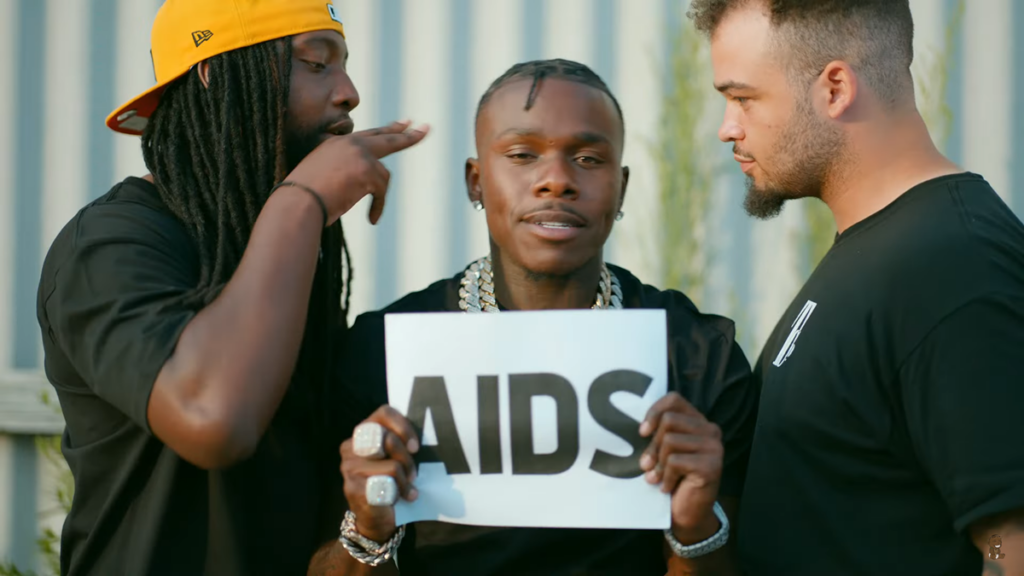
The open call for rapper DaBaby to meet with Black HIV/AIDS activists and researchers was answered by the beleaguered artist last month as fallout from his homophobic and AIDS-phobic comments in July continues to unfold.
Positive Impact
According to GLAAD, DaBaby met with Black leaders from nine HIV/AIDS organizations, including the Black AIDS Institute and the National Minority AIDS Council, on August 25. The conversation aimed to offer the rapper educational resources on the condition, how the continued stigma of HIV/AIDS affects communities of color – especially in the American South, where DaBaby calls home – and how he can positively impact communities who live with HIV/AIDS positively.
“The open letter to DaBaby was our way to extend him the same grace each of us would hope for. Our goal was to ‘call him in instead of calling him out.' We believed that if he connected with Black leaders living with HIV that a space for community building and healing could be created,” said the meeting's attendees in a joint statement.
“our way to extend him the same grace each of us would hope for. Our goal was to ‘call him in instead of calling him out.”
Joint statement of groups attending meeing
“DaBaby was genuinely engaged, apologized for the inaccurate and hurtful comments he made about people living with HIV, and received our personal stories and the truth about HIV and its impact on Black and LGBTQ communities with deep respect.”
According to those in attendance for the meeting, DaBaby “openly and eagerly participated” in conversations about the dangers of spreading misinformation about people living with HIV/AIDS and the realities of living with HIV/AIDS.
“DaBaby's willingness to listen, learn, and grow can open the door to an entirely new generation of people to do the same,” said Marnina Miller, community outreach coordinator for the Southern AIDS Coalition.
“Ending HIV stigma requires doing the hard work of changing hearts and minds, and often that begins with something as simple as starting a dialogue. We hope DaBaby will use his platform to educate his fans and help end the epidemic.”
The rapper's first musical output since the meeting, a freestyle remix of WizKid's “Essence,” appeared to offer more deflections. In a spoken word portion of the track, DaBaby seems to allude to the public response to his comments, saying “people try to, you know, assassinate your character.”
GLAAD and the Gilead COMPASS Initiative's 2021 State of HIV Stigma Study revealed that only 42% of U.S. citizens know that HIV cannot be transmitted while undergoing proper treatment. The percentage of American adults who say they “feel knowledgeable about HIV” dropped by three points as compared to last year.
“For the second year in a row, we are finding that HIV stigma remains high while HIV knowledge remains low amongst Americans,” said GLAAD's DaShawn Usher. “We have to think critically and intentionally about how we truly equip and engage everyday Americans with the facts, resources, and scientific advancements about HIV if we want to end the epidemic.”
The Black AIDS Institute's Rev. Rob Newells-Newton seconded Usher's call with specific focus on Black Americans. “Our goal is to make sure that Black people are armed with accurate information so that they can make the best choices for themselves about their sexual health,” Newells-Newton said in a statement.
“We call on Black people and our allies to: dismantle anti-Black racism; invest in transforming the socioeconomic conditions of Black people; ensure universal access to culturally-affirming healthcare; and build the capacity and motivation of Black communities to be the change agents for ending HIV.”
Black AIDS Institute Petition
While the general feeling was positive coming out of the meeting, the leaders' sit-down with DaBaby came as a group of Black HIV/AIDS activists called for the board of the Black AIDS Institute to step down. The group, which includes Black AIDS Institute founder Phill Wilson, launched a petition claiming that current board members “are disconnected from the HIV community” , are “undermining BAI's evolution,” and calls for increased diversity in the organization's leadership
The petition was in response to the sudden dismissal of BAI CEO Raniyah Copeland on August 20. Current BAI board chair Grazell Howard gave no reason for her dismissal when he announced the news last month.
“BAI can only be saved by the HIV community,” the petition reads. “This generation of leaders and people living with HIV today have to be the change they demand instead of waiting for somebody else to make it happen.”




